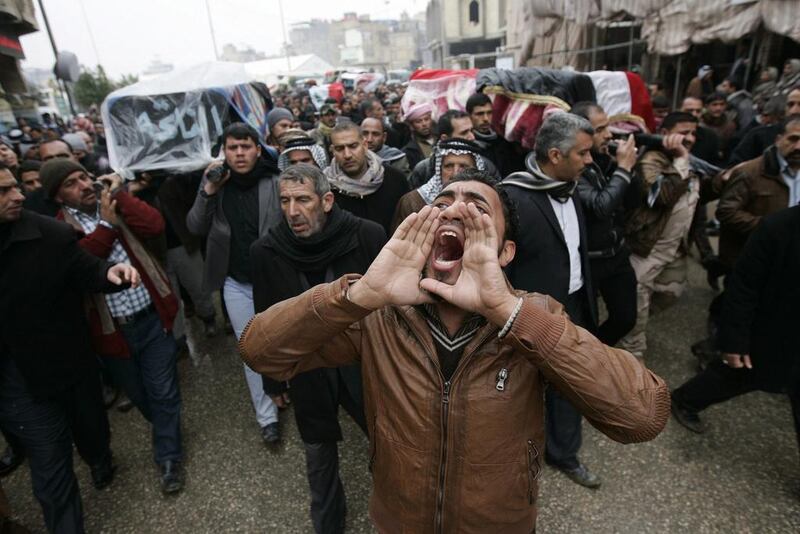Iraqi security forces and Al Qaeda-linked militants clashed in a village in Anbar yesterday as fighting for control of the province neared its third week.
Reports last night said Iraqi forces had gained ground in Ramadi, capital of Anbar and one of two cities for which they are fighting.
The fresh fighting took place in Al Bubali, a village between Ramadi and Anbar’s other main city, Fallujah. Several army vehicles were hit by roadside bombs planted around the village.
The cities are besieged by Iraqi forces and allies from Sunni tribes who are fighting to recapture them from the control of fighters of the group known as the Islamic State in Iraq and the Levant, or Isil.
Iraqis caught in the crossfire felt like they were “waiting for the Armageddon”, said Umm Nour, 32, who lives in Amreeyat Al Fallujah, a village about 35 kilometres from Fallujah.
She had no idea that her new home would become a shelter for 28 people from six families.
“The situation has become complete chaos,” Umm Nour said in a telephone interview.
The families who fled the fighting this week to stay with her had planned to return home yesterday only to find anti-government fighters had set up camp in their homes.
“My aunt lives in the eastern part of Fallujah and the situation is really bad there. I told her even if you sleep in the corridor of our house, or even if we all sleep on top of each other, it’s fine.”
The Iraqi Red Crescent said it had provided humanitarian assistance to more than 8,000 families across Anbar but that more than 13,000 had fled.
Troops have clashed with the Al Qaeda fighters mainly on the outskirts of the two cities and have launched occasional airstrikes.
But they have delayed a major offensive to retake the cities, fearing civilian deaths could push moderate tribal leaders to switch sides.
However, the defence ministry spokesman Mohammed Al Askari said yesterday the government’s patience would not last forever.
“We will be patient as long as it needs but if there is no other solution, then the security forces and allied tribal fighters will enter these cities,” said Mr Al Askari.
The United Nations and non-government organisations have warned that civilians lack access to vital supplies as a result of the government blockade on the cities.
Abu Alaa, who lives in Fallujah, also fled to Amreeyat Al Fallujah to escape the violence.
“People here are sleeping in their cars, and others are sleeping in the schools,” Abu Alaa said. “Just the other day we donated money and items to Syria. Now I’m registered as a displaced person. They brought us sugar, tea and wheat.
“I was thinking to myself: ‘Have we become poor people?’”
On January 3, hundreds of gunmen, some bearing the black flags often flown by hardline militants, gathered at outdoor Friday prayers in central Fallujah, where one militant announced “Fallujah is an Islamic state”.
“Fallujah has become a ghost city,” Abu Alaa said. “It’s militias and armed men walking around. The schools have stopped, the food stock has almost finished.”
Some shops in the city were open yesterday and imams appealed during Friday sermons for government employees to return to work tomorrow.
“Everyone is awaiting a plan or solution, or some sort of communication with the central government on how to deal with the security situation,” said Mohamed Al Dulaimy, a Fallujah resident.
Washington has piled pressure on Iraq to focus on political reconciliation and military operations to resolve the stand-off.
The Anbar crisis and a long surge in nationwide violence are among the biggest threats faced by the prime minister, Nouri Al Maliki, during his eight years in office.
They come just months before the first general election in four years.
halsayegh@thenational.ae
* With additional reporting by Associated Press and Agence France-Presse





